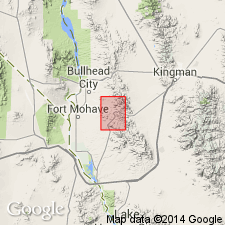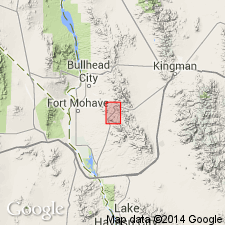
- Usage in publication:
-
- Cottonwood rhyolite*
- Modifications:
-
- Original reference
- Dominant lithology:
-
- Rhyolite
- AAPG geologic province:
-
- Plateau sedimentary province
Summary:
Cottonwood rhyolite. Very glassy spherulitic lava flows. Thickness 600+/- feet. Age is Tertiary (middle or late).
Occurs about headwaters of Cottonwood Canyon, Oatman district, northwestern Arizona, [in Black Mountains, in S/2 sec. 25, T. 20 N., R. 20 W., in vicinity of Lat. 35 deg. 05 min. 20 sec. N., Long. 114 deg. 21 min. 27 min. W., Mount Nutt 7.5-min quadrangle, Mohave Co., AZ (from USGS GNIS database and ACME Mapper 2.0, accessed November 29, 2010)].
Source: US geologic names lexicon (USGS Bull. 896, p. 530).

- Usage in publication:
-
- Cottonwood Formation*
- Modifications:
-
- Redescribed
- Age modified
- Dominant lithology:
-
- Rhyolite
- AAPG geologic province:
-
- Plateau sedimentary province
Summary:
Consists of flows and domes of rhyolite to alkali rhyolite. Contains 70 percent groundmass and 30 percent phenocrysts. The phenocrysts are predominantly plagioclase, and biotite, potassium feldspar, quartz, hornblende, and minor clinopyroxene and orthopyroxene. Has high rubidium content. Has anomalously high strontium content. Mapped (geologic maps) in northeast part of map area, northeast of Oatman, Mohave Co, AZ in the Plateau sedimentary province. Overlies Antelope Rhyolite. Underlies Flag Spring Quartz Latite (redescribed). Chemical analyses. Age modified from Tertiary to Miocene.
Source: GNU records (USGS DDS-6; Denver GNULEX).
For more information, please contact Nancy Stamm, Geologic Names Committee Secretary.
Asterisk (*) indicates published by U.S. Geological Survey authors.
"No current usage" (†) implies that a name has been abandoned or has fallen into disuse. Former usage and, if known, replacement name given in parentheses ( ).
Slash (/) indicates name conflicts with nomenclatural guidelines (CSN, 1933; ACSN, 1961, 1970; NACSN, 1983, 2005, 2021). May be explained within brackets ([ ]).

